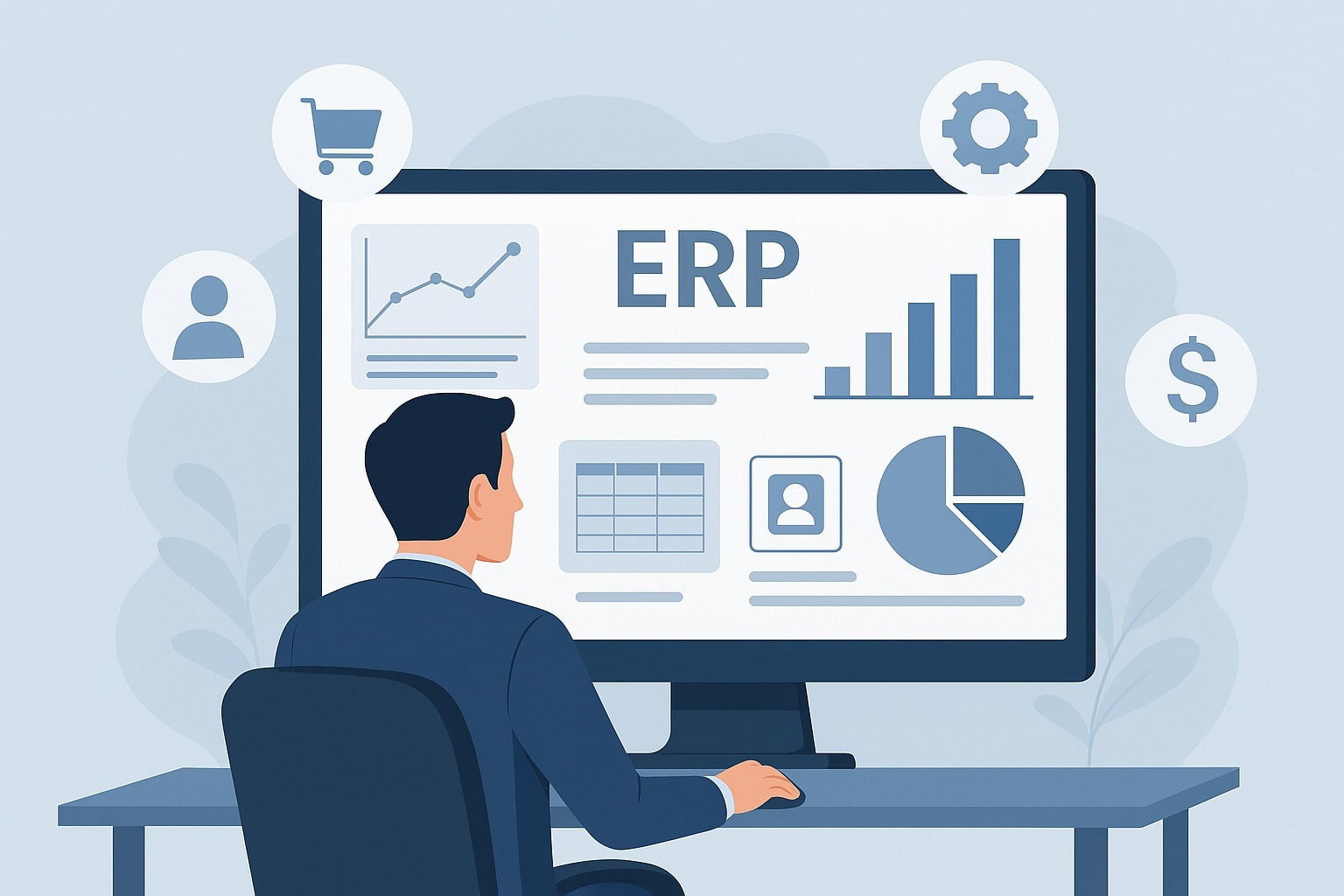KSOFT
Running a business today feels like juggling a dozen balls in the air. One slip, and everything comes crashing down. Business owners everywhere find themselves buried under spreadsheets, countless apps, endless reports, and late-night check-ins just to know what’s happening in their own company.
But here’s the truth: business owners don’t actually want more tools.
They want one dashboard to rule it all—a single platform that connects everything, gives clarity, and keeps operations under control.
This is where ERP (Enterprise Resource Planning) steps in. And not just the old, rigid ERP systems of the past—but modern, customized solutions designed with today’s business needs in mind.
Business owners often say, “If only I had one screen to see it all.”
Imagine logging into a dashboard where:
This is what ERP promises. It pulls every corner of your business into one integrated system so you can make decisions in minutes instead of days.
For those relying on Custom Web Development Services in India, ERP can be tailor-built to suit regional compliance, multi-branch setups, or even industry-specific needs. It’s not just software—it’s your digital command center.
Think about a mid-sized manufacturing company. Without ERP, the owner might be jumping between accounting software, a warehouse spreadsheet, and a separate HR system just to understand the day’s status. With ERP, one dashboard shows production, orders, finances, and employee shifts all together. That single shift saves not only hours but also eliminates blind spots that often cost money.

Time is money, and business owners hate wasting both. Yet, every day is spent chasing updates from teams, correcting duplicate entries, or fixing errors made because “the system didn’t talk to the other system.”
Modern ERP solutions offer Automation Solutions for Small Businesses—eliminating repetitive tasks like manual billing, order entry, or stock checks.
Example: Instead of an employee manually updating stock in an Excel sheet after every sale, the ERP system automatically reduces inventory in real-time and alerts you when levels run low.
This doesn’t just save time—it reduces costly human errors. For instance, overstocking drains cash flow while understocking disappoints customers. With ERP automation, these mistakes become rare.
Business owners also gain confidence. They no longer need to micromanage or “double-check” their team’s numbers because the system itself ensures accuracy. Control is maintained, but time is finally freed up to focus on strategy and growth.
Successful business owners know that decisions based on gut feeling can cost millions. They want numbers, insights, and predictions.
With Custom Software Development with AI, ERP systems now go beyond tracking. They analyze data, identify trends, and even suggest actions.
For example:
This matters because many businesses fail not due to lack of demand, but due to poor planning and lack of visibility. A retail store might think it is doing well until an ERP system shows that while sales are strong, margins are shrinking because of rising supplier costs.
ERP doesn’t just inform—it empowers. Owners who once made choices in the dark now run their businesses with precision, backed by real-time intelligence.
Growth is exciting, but it’s also messy. New hires, new customers, new suppliers, new challenges. Without the right system, growth turns into chaos.
Business owners who wanted to scale without losing their sanity are now leaning on ERP systems that grow with them.
Take, for example, Startup Tech Services. A growing startup might begin with 10 employees, but within two years, it could expand to 100. Without ERP, every department would create its own isolated system, leading to confusion. With ERP, however, all processes—finance, HR, projects, sales—expand smoothly under one system.
It’s like building your business on solid ground instead of sand.
A case in point: consider a restaurant chain expanding from two outlets to ten. Without ERP, each branch tracks sales and inventory differently, making it impossible for the owner to see the overall picture. With ERP, all outlets feed data into the same dashboard, allowing the owner to plan supplies, marketing, and finances across the entire chain with ease.
One of the biggest frustrations for business owners is siloed communication. Marketing doesn’t talk to sales. Sales doesn’t talk to accounts. Accounts don’t talk to operations.
ERP changes this dynamic. It ensures every team sees the same data at the same time. No version mismatch, no excuses, no delays.
And for modern companies, ERP can integrate with Social Media Management for Startups—giving business owners insights not just from internal operations but also from customer engagement and brand presence.
Imagine logging into your ERP dashboard and seeing sales numbers alongside social engagement rates. That’s not just efficiency—it’s business intelligence.
When departments work together on shared data, collaboration improves, productivity rises, and customers get faster responses. Business owners no longer waste time being the “middleman” between departments—the system itself keeps everyone aligned.
Business owners don’t just want features. They want peace of mind—the assurance that their system won’t crash in the middle of payroll, or that sensitive client data won’t leak.
That’s why ERP providers today pair systems with 24/7 Technical Support for Websites & Apps. Whether it’s a midnight issue or a mid-day glitch, support teams are there to fix it instantly.
Combine that with advanced data encryption and role-based access control, and business owners finally sleep better knowing their operations are running securely.
A single security breach can destroy trust. ERP systems that integrate strong security protocols ensure that only the right people access the right data. This gives business owners confidence not just in operations but also in compliance with laws and regulations.
For many business owners, revenue is the top focus. But scattered sales channels, disconnected e-commerce systems, and manual order processing create frustration.
Here’s where ERP merges beautifully with Custom E-Commerce Store Development. Instead of juggling separate systems for Shopify, WooCommerce, or physical store sales, ERP centralizes everything.
Example: A boutique owner selling through Instagram no longer needs to manually track orders in Excel. With ERP, every order, every customer, and every delivery is automatically synced in real-time.
This unified sales view allows owners to see which channels perform best, which customers bring repeat business, and which products deserve more marketing investment. Selling smarter becomes a reality, and growth happens without unnecessary stress.

Today’s entrepreneurs aren’t just thinking local. They’re dreaming global.
ERP systems enable multi-currency billing, cross-border taxation, and international logistics tracking—features that give small businesses the power to compete with global giants.
For business owners in India, combining Custom Web Development Services in India with ERP integration means you can build platforms that compete on a world stage while staying locally compliant.
Imagine an online clothing brand in India expanding into the U.S. Without ERP, managing different currencies, shipping timelines, and tax rules would be overwhelming. With ERP, all of it becomes manageable under one system, giving small businesses the power to look—and operate—like established global players.
Every business owner ultimately dreams of this: simplicity, control, growth, and clarity in one system.
That’s exactly what a modern ERP delivers:
This is not just software. It’s the business command center every owner has been waiting for.
Business owners don’t want complexity. They don’t want to manage a dozen disconnected apps. They don’t want to waste hours chasing updates.
What they want is one dashboard to rule it all.
ERP is not just another tool—it’s the single, central nervous system of a modern business. And for those who choose to adopt it, the reward is clear: time saved, costs reduced, smarter growth, and total control
